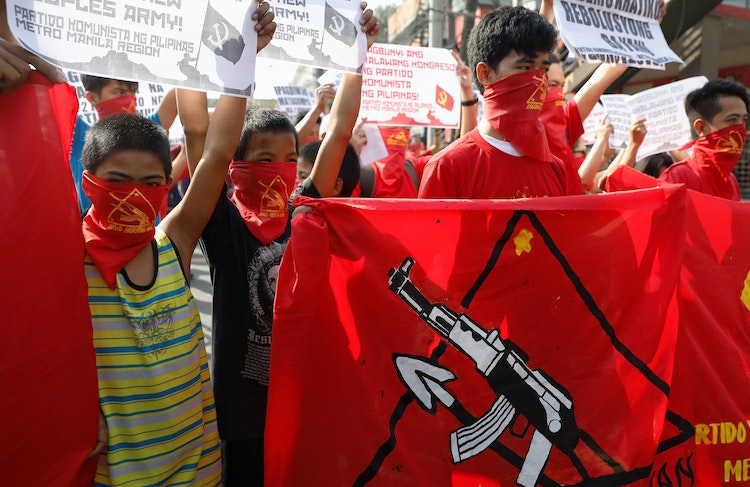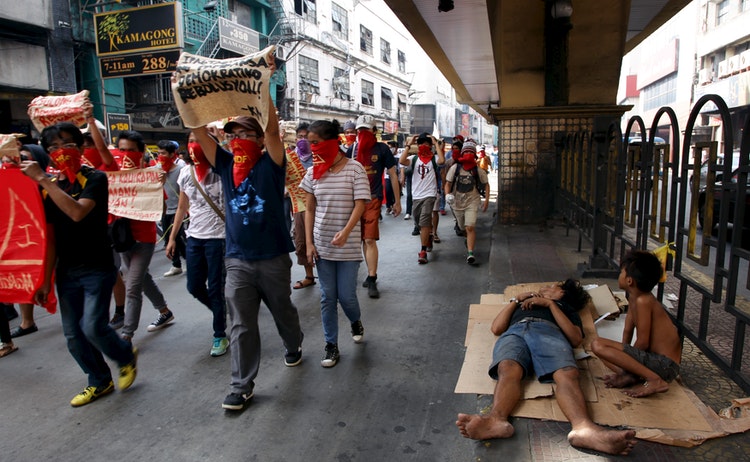
Why you need to know
Interested in joining the armed wing of the Communist Party of the Philippines? A millennial shares some inside observations to help you decide whether you have what it takes.
By an Anonymous Author
Let’s make one thing clear: I am no expert. At best, let’s say that I am a keen observer; a relative outsider with some insight into the daily life of a Filipino guerrilla. I will not be making bold statements with extremely adept information into the workings of the New People’s Army (NPA). I will simply provide some small but, in a way, “guerrilla” life hacks about what somebody will need when joining Asia’s longest running communist revolution.
The NPA was established on March 29, 1968, shortly after the dissolution of the Philippine’s previous guerrilla movement, the Peoples' Liberation Army – or the Hukbalahap (Hukbong Bayan Laban sa Hapon). The Hukbalahap, which resisted the World War II Japanese colonization of the Philippines, became a precursor to the modern guerrilla archetype.
The NPA, which acts as the armed wing of the Communist Party of the Philippines (CPP), has polarized Filipinos for as long as it has existed. In cities and in mainstream media, you will often find depictions of the army demonized as terrorists and bandits. Posters advertising rewards for the capture of wanted NPA members adorn many public areas. President Rodrigo Duterte occasionally floats peace talks with the NPA – but only when he is not set on killing its members.
However, among leftist circles and ordinary folk in rural areas, they are hailed as modern heroes, a band of merry men and women defending the unarmed from those who seek to militarize and bulldoze their communities.

Photo Credit: Reuters / TPG Protesters in Manila hold up banners as they march in support of the Communist Party of the Philippines.
I belong to the latter category of people. I am not from one of the far-flung parts of the archipelago, but I still hold great admiration for the sacrifices of a group which started out as a ragtag band of intellectuals and now holds strongholds throughout most the country, with members coming from diverse backgrounds.
Interested? You think you have what it takes? You probably do. As a matter of policy, the NPA does not reject anybody over 18 years old willing to learn and contribute. There are only two exceptions: those who are not in a sound state of mind and body, and those who are tied to the military in any way.
This guide may not be for everyone, but if you are a revolutionary looking to join your comrades – or if you are interested in why thousands of Filipinos have viewed the struggle as their lone defense against decades of poverty, corruption, and exploitation – here are a few tips:
1. Carry a notebook everywhere
You did not come here just to fight; you came to learn and to teach whatever your particular skill set may be. You will often be tasked to organize peasant groups, get in touch with local associations, and correspond with the local authorities to carry out an assortment of duties. The most important will be to organize, gather information, create a support network, and mobilize people into either campaigning for their rights or directly contributing to the people’s war in any way possible. Not to mention, you will be getting attuned to the local dialect.
To do this, you will need to write down just about everything you see and hear. No detail is too small. You will need to make your own dictionary and figure out the grammar of the local dialect through practice. Maybe a month or two will get you on your feet and get rid of that city slang that exposes you for who you were not long ago.
When walking or indoors, never point the shooting end of your rifle frontwards, backwards or sideways – you never know when something can go wrong. Always have it aimed towards the sky or the ground.
A more important use for your notebook is getting to know the roots and interrelations between the people you come across. Many of them are related in some way, either by blood or by family history. This will come in handy when getting people together and trying not to mix in those who have had misgivings in the past. It will also help you get in touch with others in both nearby and distant communities.
Knowing whose brother is married to someone else’s sister and has a child married to someone else’s cousin may seem like a daunting and unnecessary chore, but it goes a long way in helping to build networks and connections between those ready to help their family in the struggle.
2. Brush up on your rifle etiquette
Not sure if this goes without saying – maybe it doesn’t for some. Never bring a dirty and unreliable gun to a protracted guerrilla war. Knives are certainly handy for foraging and looking for food. But this would not be a guerrilla movement without some hand-me-down rifles taken as spoils from victorious encounters. And nobody wants their rifle to be spouting mud from the chamber when they chance upon government soldiers.
Ask some of the more senior people in your squad about how to clean the specific rifle issued to you. Clean it often, and never let it get lost. When walking or indoors, never point the shooting end of your rifle frontwards, backwards or sideways – you never know when something can go wrong. Always have it aimed towards the sky or the ground.
Always sleep beside your rifle. The night is dark and full of terrors. You should avoid bringing it out in the daylight where many people are present – but, at the same time, you should never stray too far from it.

Photo Credit: Reuters / TPG Filipino communist rebels march in Mount Diwata, Surigao del Sur in the southern Philippines.
3. Don't forget your manners
In your daily work with the masses – when you will regularly carry your gun into the homes of strangers – the least you can do is have some manners and remember what brought you there. Be courteous: the ideal armed house guest. Nobody likes an intrusive figure clad in black holding a rifle arriving unannounced and then staying the entire day without speaking. It is unnerving, to say the least.
More than manners, have a sincere interest in learning and talking with the people you are visiting. You are there to aid them; their homes are not a motel. This is where the NPA gains its best reputation: from concretely and tangibly serving the masses. Do the cooking, farming and helping with chores that you would normally do in your own home. This in itself redefines what an armed group is supposed to be. The NPA is not merely a defense unit for the oppressed. It is one that integrates itself with daily practices, making hospitality its own form of revolutionary discourse.
4. Discover the joys of a transistor radio
Bored? Homesick? Getting separation anxiety from the lack of internet and television? You can always bring a book. However, in the absence of one, you will surely embrace the emotional rollercoaster provided by your transistor radio.
Need to practice that unfamiliar dialect? Want to get a whiff of the Duterte administration’s latest fascist policy? Need a Spotify-like fix? Looking for a new talk show to follow? New topics of conversation? Say no more. Your old transistor radio is now your best friend. Just remember to always have some spare batteries around.
The NPA is not merely a defense unit for the oppressed. It is one that integrates itself with daily practices, making hospitality its own form of revolutionary discourse.
Radio dramas in the afternoon with dramatic, exaggerated pronunciations will make you go far in achieving the correct revolutionary denunciations when the need for propaganda agitation arises.
Without electricity or a newspaper in sight, you will need to listen every morning for the latest political developments, locally and nationally. Even correcting the often misguided and misinformed news about the activities of the Red Army is just a phone call away – although, be warned, phones are hard to come by.
Leisure and recreation also centres around the use of the radio – at night, just before bed, listening to some music or the comedic repertoire of whoever is on. It beats chess.
5. Learn to love the art of tent-making
All may be friendly between co-guerrillas, but there is some friendly competition with things you might normally regard as nonchalant. For some reason, sewing and setting up tents evokes a competitive spirit unseen in other groups.
You might find that the love of your life is simply the man or woman who makes the best tent or shelter whenever camping out in the wilderness. These are not the tents you would normally see from campers. They are makeshift wonders, and a survivalist’s dream.
Using only sticks, twigs, car insulators, cellophane, thick plastic covering, and whatever else is handy, a true guerrilla can settle down and snag some shut-eye at a moment’s notice. It takes some creativity and resourcefulness to pull this off, but the best-looking shelters offer a surprising amount of comfort and security that may seem irresistible.
Looking for your next hike? Advance the revolution!
Why not skip your next plan for a trek and try out the ranks of the NPA? Try it for a week, or a month, or for the rest of your life.
I do not mean to demean or reduce the significance of the contemporary Filipino revolution to a fleeting internet write up. However, I find it useful to humanize our dissidents. They are people with real feelings, aspirations, and emotional spirals. They always have each other’s backs and are ready for a struggle as a matter of principle and sacrifice. More often than not, comrades will always offer a hand in teaching you how to build your own dwelling or any adjustments you might have some difficulty with.

Photo Credit: Reuters / TPG Masked members of the New People's Army protest the Asia-Pacific Economic Cooperation (APEC) summit in Manila, November 2015.
If you find yourself interested, dig into some reading about why, outside of Filipino urban centers, the archipelago is a hotbed for revolution. The simplest explanation would be that many Filipinos face chronic poverty, exploitation and repression on every one of the country’s 7,000-plus islands. Many believe their only hope is to overhaul the system that forces this upon them.
Obviously, advancing the revolution is not an easy thing to do. More often than not, you will find that the little things will bother you the most. In my limited experience and interaction with the NPA, it seems that the best way to integrate with them is to have good reasons for being there. Ultimately, they should have everything to do with serving the people.
Read Next: EXPERIENCE: Holiday with the Guerrillas in the Philippines

No comments:
Post a Comment
Note: Only a member of this blog may post a comment.